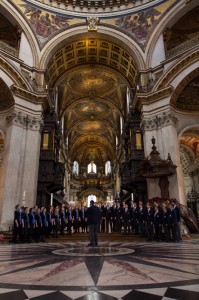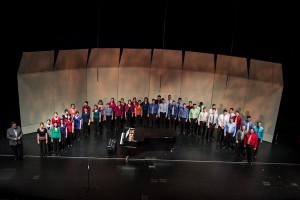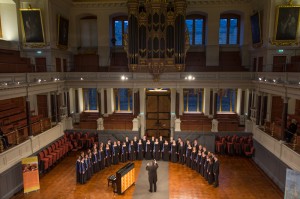BYU Singers Endowment
Uses of the Endowment
1. To help local presenters secure appropriate concert venues when BYU Singers tour that will better allow the choir to accomplish their greater mission.
 Experience has taught us that the choice of venue greatly determines the success of any BYU Singers concert, whether in the U.S. or abroad. Venue has everything to do with make-up and size of the audience. For budget reasons, we have most often sung in LDS church buildings while on tour. Yet when booked into venues associated with excellent concert offerings, we have drawn larger, more broadly based audiences in terms of religious background and cultural experience. We seldom see non-LDS choral musicians at a concert in an LDS venue, while we frequently see professional choral musicians, often of distinguished reputation, at a concert in a venue offering prestigious classical concerts. An easily understood issue associated with venue is that of acoustics, which has everything to do with the overall sound of the choir in concert. We hope to sing well, even in the challenging circumstances of a hall with little or no reverberation, referred to by musicians as “ungrateful.” Our concerts are about sound – beauty of sound, and the manner in which that sound affects the hearts and minds of all participating in the concert – audience and choir members alike. We are convinced that even the least experienced concertgoer can easily discern the enormous difference made by a venue’s acoustical properties. It is important to remember that BYU Singers do not rely on electronic means to communicate their sound. The choir’s singing is designed to communicate directly from soul to soul and heart to heart without the impediment of a microphone or electronic amplification.
Experience has taught us that the choice of venue greatly determines the success of any BYU Singers concert, whether in the U.S. or abroad. Venue has everything to do with make-up and size of the audience. For budget reasons, we have most often sung in LDS church buildings while on tour. Yet when booked into venues associated with excellent concert offerings, we have drawn larger, more broadly based audiences in terms of religious background and cultural experience. We seldom see non-LDS choral musicians at a concert in an LDS venue, while we frequently see professional choral musicians, often of distinguished reputation, at a concert in a venue offering prestigious classical concerts. An easily understood issue associated with venue is that of acoustics, which has everything to do with the overall sound of the choir in concert. We hope to sing well, even in the challenging circumstances of a hall with little or no reverberation, referred to by musicians as “ungrateful.” Our concerts are about sound – beauty of sound, and the manner in which that sound affects the hearts and minds of all participating in the concert – audience and choir members alike. We are convinced that even the least experienced concertgoer can easily discern the enormous difference made by a venue’s acoustical properties. It is important to remember that BYU Singers do not rely on electronic means to communicate their sound. The choir’s singing is designed to communicate directly from soul to soul and heart to heart without the impediment of a microphone or electronic amplification.
2. To help with the financial backing required so that BYU Singers may accept the prestigious performance invitations which continue to be extended in ever-increasing numbers.
Good examples of these sorts of opportunities are demonstrated by BYU Singers’ participation at national and regional conventions of the American Choral Directors Association, the bi-annual conference of the National Collegiate Choral Organization, and the conference of the National Bible Association. Sometimes these performance opportunities can be combined into our set touring schedule, as was the case with the invitation to represent the U.S. at the International Symposium on Choral Music in Sydney, Australia. But most often, such invitations are in addition to our touring schedule.
3. Provide voice lesson scholarships for worthy members of the choir who fall below the desired level of vocal technique that is expected of members of BYU Singers.
 To be clear, Dr. Crane never wants to entice a person into participating in BYU Singers by offering a financial bribe. Such a situation has every chance of resulting in attitude and commitment problems. More and more we face the situation where, in order to organize a balanced choir, we must include promising students on the roster whose singing does not yet meet the desired level. As the number of high quality choral programs in secondary schools continues to slide, with more and more programs totally disappearing in schools, the level of choral experience and overall vocal ability of students auditioning for BYU Singers continues to decline rather noticeably. This means we have students who desire the BYU Singers experience arriving at auditions without the expected vocal technique and experience. These are often the best students auditioning, especially in the bass and tenor sections! So when students exhibit strong musical sensibilities and the promise of good vocal ability, along with the strong personal qualities we look for in individual BYU Singers, we sometimes accept them into the choir in order to balance the sections, hoping we can teach and coach these students into the vocal technique and quality required. We have seen satisfying results of this process in recent years, especially when these students are able to seek individual vocal instruction from a trustworthy teacher who can teach and coach the student in those initial weeks and months in Singers. Too often, however, we discover that a student, showing good potential, is not in a financial position to pay for such instruction. Imagine the difference a scholarship for voice lessons would make not just for the individual student, but for the entire choir, especially in terms of our performance ability and the speed at which we need to arrive at a high level of performance.
To be clear, Dr. Crane never wants to entice a person into participating in BYU Singers by offering a financial bribe. Such a situation has every chance of resulting in attitude and commitment problems. More and more we face the situation where, in order to organize a balanced choir, we must include promising students on the roster whose singing does not yet meet the desired level. As the number of high quality choral programs in secondary schools continues to slide, with more and more programs totally disappearing in schools, the level of choral experience and overall vocal ability of students auditioning for BYU Singers continues to decline rather noticeably. This means we have students who desire the BYU Singers experience arriving at auditions without the expected vocal technique and experience. These are often the best students auditioning, especially in the bass and tenor sections! So when students exhibit strong musical sensibilities and the promise of good vocal ability, along with the strong personal qualities we look for in individual BYU Singers, we sometimes accept them into the choir in order to balance the sections, hoping we can teach and coach these students into the vocal technique and quality required. We have seen satisfying results of this process in recent years, especially when these students are able to seek individual vocal instruction from a trustworthy teacher who can teach and coach the student in those initial weeks and months in Singers. Too often, however, we discover that a student, showing good potential, is not in a financial position to pay for such instruction. Imagine the difference a scholarship for voice lessons would make not just for the individual student, but for the entire choir, especially in terms of our performance ability and the speed at which we need to arrive at a high level of performance.
4. To assist needy members of BYU Singers with their tour payment. Such assistance would be give to members of the choir who make a strong contribution to its success, but who do not possess the means to pay part or even all of the tour payment assess by the university.
While the cost of major tours is strongly subsidized by the university, each student is currently assessed $1500 for the tour. Students are also responsible for purchasing whatever matching tour clothes are required for the trip.
5. To help with the increasing costs of printed programs that reflect the quality of the BYU Singers performance and tell the BYU Singers story – its history and mission.
 Our tour program to England in 2012 served as an initial valiant effort to accomplish this goal. The program was in color, featuring performance photos of the choir, photos of BYU and the Harris Fine Arts Center, and photos and brief bios of individual choir members.
Our tour program to England in 2012 served as an initial valiant effort to accomplish this goal. The program was in color, featuring performance photos of the choir, photos of BYU and the Harris Fine Arts Center, and photos and brief bios of individual choir members.
6. To help fund special projects to further Singers’ mission. This includes recordings and videos released as a gesture of good will, hoping they will serve as a positive, beautiful response to the ugliness, vulgarity, corruption, and violence in the world.
Such efforts can also be enormously helpful in promoting concerts at home and abroad, in educating audiences to the beauties and ennobling value of the music we sing, and in furthering awareness of BYU Singers – and the good they do and can yet do – in the world. Since the production of major video projects has been suspended by the university, at least for the foreseeable future, our means of getting our message out to the world is through free audio downloads and well-produced videos on our YouTube channel. Our efforts here are severely limited because we lack the funding.
7. To help with special performance needs, which greatly add to the success of a BYU Singers concert.
This includes special performance attire, stools, special instruments, etc.
FAQs
When was the endowment established, and who are its donors?
Our endowment was established in 1991, and it has been growing consistently in the years since. We have had several major donations from Singers alumni and friends of the choir, and a steady donation stream from many alumni who have committed to donating a smaller amount every month. These donations together with compound interest on the principal have reached a level that now allows some interest to be used every year to help the choir. The fund is still actively seeking donations, as the costs of the goals set in 1991 have risen steadily.
Where is the endowment fund account held, and who oversees it?
BYU Singers Endowment Fund is in a BYU account, and is invested and overseen by LDS Philanthropies.
Is there any precedent for this fund?
The Jewkes Fund was established in the early 1980s for the use of the BYU A Cappella Choir, BYU Singers’ predecessor. While it generates a much smaller amount, monies from that fund have been used to help BYU Singers endeavors, allowing their endowment fund to grow.
What will happen to the fund in the future as the choir has other conductors?
The fund was established to help BYU Singers or the current touring choir. Just as the uses of the interest were determined by Dr. Staheli in the first two decades of the endowment fund, Dr. Andrew Crane now has control over the interest generated. The principal will remain intact to furnish the interest used.
Click here for a printable version of this page.

